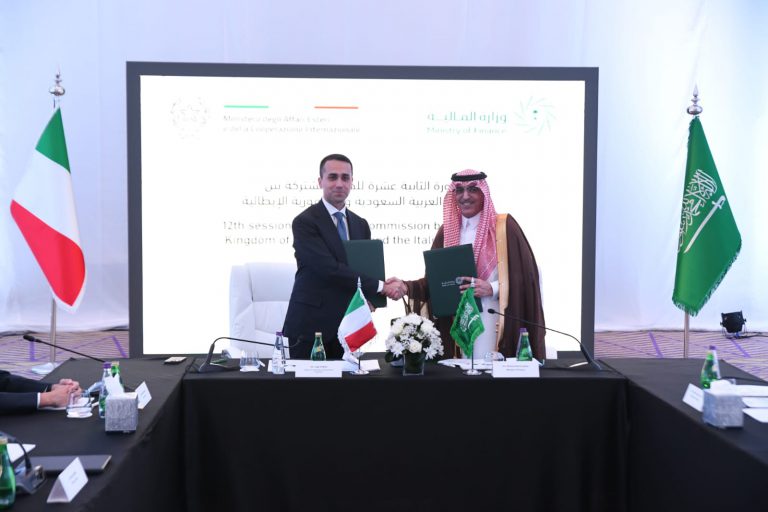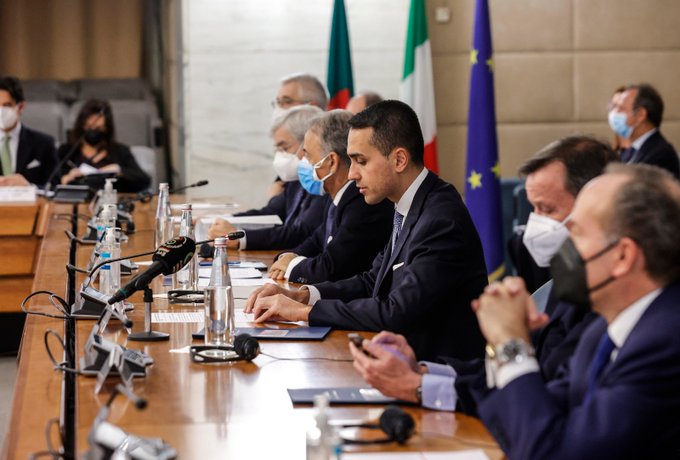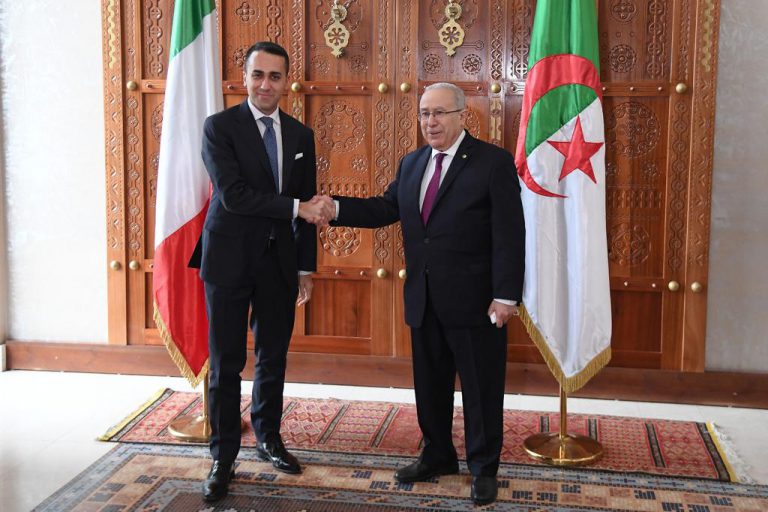It was clear that the technocratic government had to put a technocrat in the Ministry of Foreign Affairs, i.e. someone from the world of diplomacy: an ambassador. And Premier Monti chose Giulio Terzi di Santagata, our diplomatic representative at the time in the most prestigious of all posts: Washington.
A field promotion for Terzi, who found himself propelled immediately onto an international stage never before so laden with delicate and complex concerns, which he has confronted with the tact and experience of a diplomat. He received us in his office at the “Farnesina Palace”, as simple and spartan as the rest of the massive 1930s structure that houses the Ministry of Foreign Affairs. The interview encompassed all the most sensitive issues of the moment (from the European dimension to transatlantic relations, the challenges of the new Mediterranean and the Syrian crisis) and rapidly evolved from what could have been a simple question-answer session into a fluid discussion, for the most part very amiable, punctuated by specific examples and founded on the criteria of moderation and common sense.
Mr. Minister, your mandate practically coincided with the most crucial moment of the so-called Arab Spring. Following the recent developments in Libya, culminating with the assassination of the American ambassador in Tripoli, and also in Egypt, do you think the definition still stands?
We are very determined to lend our support to the countries in transition. Strengthening democratic institutions and the rule of law in countries that, after long years of dictatorship, have expressed their desire, through the vote, for moderate leadership, is a strategic foreign policy priority for Italy. The demand for democracy and economic development coming from these populations, and especially from their young people, can only be fully satisfied through a process of democratic institutional consolidation, which necessarily takes time. But it is also necessary to heed the encouraging signs that are abundant.
The elections in Egypt, which led to the installation of President Morse in July followed by the August swearing-in of a government led by Prime Minister Qandil, paved the way for completion of the democratic transition. The Libyan people demonstrated their determination to stabilise their country in the legally-conducted July elections that saw a voter-turnout of 62%, of which – and this is a critical aspect – 39% were women. Last year’s legislative elections in Tunisia were carried out correctly, as witnesses by international observers, and the voter-turnout there also was high, leading to the formation of a government supported by a broad coalition of parties.
What role is Italy currently playing in North Africa, indeed the area that takes in Tunisia, Egypt and Libya?
Italy is a point of reference for the countries of the region. Our exports to the “greater Mediterranean” rose by 19% in 2011, overall trade stood at €82 billion, and there are over 3,300 Italian companies operating in the region. The instrument of development cooperation is also contributing to strengthening those democratic transitions. Since the start of the Arab Spring our overall cooperation commitments in the area have amounted to approximately €250 million in donations, loans and debt conversions.
On the European front, within the framework of the new EU Neighbourhood Policy, we are encouraging our partners to increase the resources they make available to the southern shores of the Mediterranean in order to build a stronger and broader partnership in strategic sectors such as economic and social development, mobility and immigration collaboration, energy and education. In just a few short months Italy has strengthened the European Union’s external action along the lines of our priorities, particularly with regard to the Mediterranean. The results achieved in Italian bilateral relations with the new Arab leadership have been put to use at European level, beginning with strategic partnerships with Egypt and Tunisia.
The Syrian situation continues to occupy centre stage and is an especially delicate chapter in light of the ripple effect it could have internationally. President Assad refuses to step down and continues to bombard the rebels, while in the meantime risking war with Turkey. Is this the most worrying scenario on the world stage? And what is Italy’s position?
The prolongation of the crisis in Syria carries the risk of destabilising the entire region, and Assad and his regime bear full responsibility for the situation. A military solution to the Syrian crisis does not exist. The only solution is a political one and it is the Geneva Plan that was accepted by the United States, Russia and the countries of Europe. The plan calls for the cessation of the violence, the launch of a transition with the participation of all the principal forces of the Syrian society and Bashar Al Assad’s removal from power. On these bases, Italy fully supports the efforts of UN and Arab League Special Envoy Brahimi.
We have long hoped for a peacekeeping mission in Syria, but the UN Security Council has to give its go-ahead. Meanwhile, Italy is doing its part to confront the humanitarian emergency as well as to foster a political solution, promoting unity among the opposition forces and preparing for a post-Assad Syria. The Italian government was among the first to send direct humanitarian aid – you will recall the field hospital set up with the help of the Amman authorities at the border between Jordan and Lebanon – as well as in collaboration with international organizations such as UNICEF and its assistance to displaced Syrian children.
Italy also maintains a contingent of 1,000 blue helmets in the UNIFIL mission in southern Lebanon: what role does Italy play in an area so close to the Syrian crisis?
Italy’s is one of the largest of the UNIFIL mission contingents at the Lebanon-Israeli border; and never before has it been so critical to ensure stability there as in this period of such difficult regional equilibrium. Lebanon is crucial to Mediterranean and Middle East stability which, in turn, has an impact on our own security. The appointment in January of General Serra as mission commander was acknowledgement of that professional skill that has come to be spoken of as “Italian style” management of international missions. I was able to verify in person on a visit to Lebanon and in meetings with the authorities there, that General Serra’s efforts are appreciated by all the Lebanese political forces. We have often reiterated the Italian government’s support for Lebanon’s policy of “dissociation” from the Syrian crisis, not least in the wake of the attack on 19 October in which General Wissan al Hassan was killed. The UNIFIL mission is one of the most important contributions that Italy is making on the ground in support for Lebanese forces trying to hold off the potential spread of the crisis to the region.
Barak Obama has just been re-elected to the presidency of the United States, thanks also to merits accrued in the past four years of foreign policy. Do you think he will remain faithful to his strategy or change it?
With the re-election of President Obama American foreign policy will maintain the path it has taken over the past four years: dialogue, multilateralism, and an open attitude toward guidance and support for the democratic transitions under way in Arab and Mediterranean countries. This continuity makes America and transatlantic relations stronger. For its part, the United States will continue to support the European integration process and a stronger Europe more capable of confronting global challenges.
Accounting for over half of world GDP, the EU and the U.S. have a natural alliance, and an even stronger one today, cooperating also within the G8 and G20 on stimulating growth and promoting stability in financial markets.
President Giorgio Napolitano has invited us to accept a “reduction in sovereignty” for the better of the European Union and in favour of resolving the serious economic crisis afflicting its members. What is your opinion?
The invitation is one of extremely high political resonance, and deserves to be embraced with steady determination. Our head of state is fully aware that Europe must go forward on the path of greater economic and monetary union and that innovation calls for a further transfer of decision-making power and sovereignty.
This same conviction led to reflection and analysis in recent months by the “Group on the Future of Europe”, a group of the eleven traditionally most Europe-leaning Member State foreign ministers. A convergence of views emerged that has become a highly important base from which Europe will be able to move in confronting major challenges such as reacting to populism, strengthening the governance of the economic and monetary union on the basis of responsibility and solidarity, human rights and religious freedom.
The question of the two Italian marines being held in India. The New Dehli authorities have really overstepped the boundaries of custom and of treaties. What will the foreign ministry’s position be?
The Enrico Lexie’s presence in Indian waters was the result of subterfuge by the Indian police, who asked the ship to enter Indian territorial waters in order to identify some suspected pirates. The marines were taken into custody by a contingent of over 30 Indian police officers who boarded the Enrica Lexie. Given the circumstances, in the first place we obtained special detention conditions appropriate to the status of military personnel, ensuring the presence and assistance of a highly qualified team of Italian and international legal experts consisting of over 50 lawyers, forensic experts and diplomats, who are studying the dossier.
The two main precepts of international law being applied in this specific case are: the exclusive jurisdiction of the State under whose flag the ship is sailing in international waters, and the immunity of two military personnel acting as agents of the Italian State in counter-piracy operations. We have submitted the case to the attention of the European Union, the G8 and ASEAN. I have personally spoken to UN Secretary General Ban ki-Moon, and the EU once again recently publicly confirmed it support for our position. We will not rest until Salvatore Girone and Massimiliano Latorre are home.






